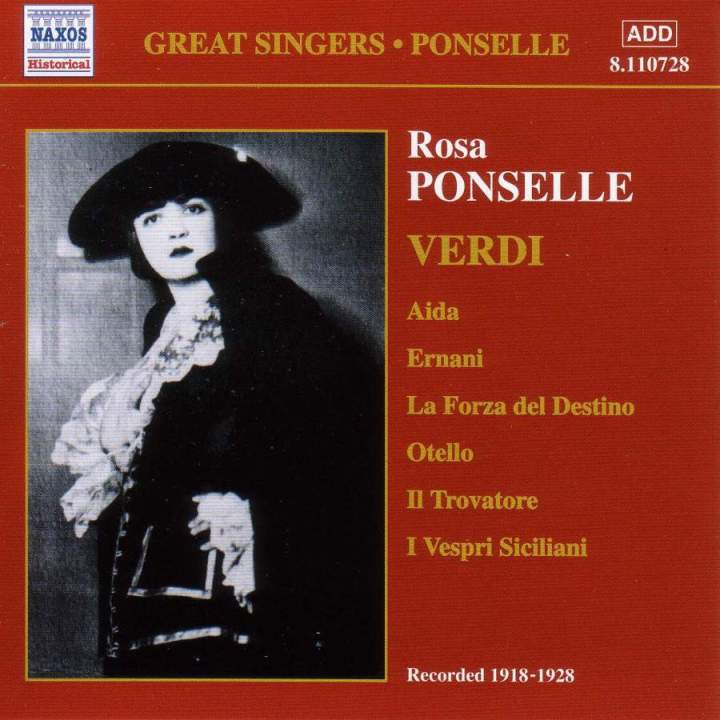
Rosa Ponselle is known for having one of the most extraordinary voices ever to be recorded. Along with Caruso and Ruffo, she was one of Serafin’s “three miracles” and had a voice of unparalleled richness and power. According to Walter Legge, the voice was “majestic, enormously rich in overtones. Her legato was perfect with a breath control that only makes the listener breathless with amazement.”
Her career was not long, and she retired relatively early at the age of 40. Some say her withdrawal from the stage was precipitated by adverse criticisms for her Carmen, but it could just as well have been put down to her shrinking top register. The rest of the voice remained admirably secure and rich however, and recordings made at her villa in the 1950s reveal it still to be firm as a rock, though she hadn’t sung in public for many years.
Her first recordings were acoustics made for Columbia, but she switched to Victor in 1923, when from 1925, her recordings were made using the electrical process, and all the recordings here have been produced by Ward Marston. The collection gathers together just one recording of every Verdi extract Ponselle recorded, so there are no duplications and, where she did record an extract twice, Marston has chosen whichever he considered to be the best, regardless of whether it was acoustic or electrical.
If we are to think of the ideal Verdi soprano, then Ponselle is undoubtedly the voice to which one would turn, its timbre rich and velvety with ample reserves of power, admirably firm but flexible, limpid and responsive. If there are any faults, they tend to be attributable to the recording process and the strictures of side lengths, thus the recitative to the Ernani aria is somehwat perfunctory and rushed where Callas is incredibly detailed with a much greater range of tone colour. There is also a rather unseemly dash to the end of the Siciliana from I Vespri Siciliani and there are other times when the rushed tempi seem more dictated by the length of a 78 side than from any artistic decision.
I wonder too about pitch. Ponselle was known to occasionally employ downward transpositions, so would D’amor sull’ali rosee (recorded acoustically in 1918) be sung at pitch, gven the fact she opts for the optional high Db? It is a lovely performance, the high notes poised and beautifully integrated into the line, so maybe questions of pitch don’t really matter, though they would affect the sound of the voice itself.
I am not a totally devout worshipper at the Ponselle shrine and there are times when I miss Callas’s absolute mastery of Verdian style and innate musicality. Her voice may have been a more unwieldy instrument, but I never question her artistic choices, where sometimes I find Ponselle wanting. Still, these are all treasurable recordings, not only the arias, but the duets with Martinelli, Pinza and Stracciari and the final trio from La Forza del Destino with both Martinelli and Pinza, surely one of the greatest versions of ths scene ever committed to disc. The Miserere (with Martinelli) suffers from being taken too fast, but it does exploit her gloriously rich lower register, but La vergine degli angeli from La Forza del Destino, is a locus classicus of Ponselle’s masterly control, her legato perfect and the line spun out on a pure, firm thread of sound the likes of which you will not hear from any other singer.
Of course Ponselle was much more than a Verdi soprano, as we know from recordings of excerpts from Norma, La Gioconda and L’Africaine, as well as songs, but it is good to have here a collection of Verdi arias sug by arguably the greatest Verdi soprano of the pre WWII era.